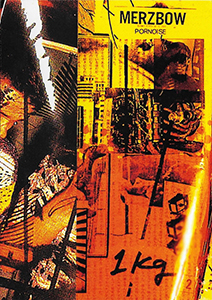 Pornoise 1 KG is somewhat of a landmark release in Masami Akita’s sprawling, ever expanding and complex discography. Recorded in 1984 and issued multiple times as a five-cassette set not long after, it represents one of the first long form collections of Merzbow to have been released. Reissued here on six CDs (including the separately released Pornoise Extra as disc six), it makes for an excellent snapshot of what Akita first started out doing, and hints at what would come later in his long career.
Pornoise 1 KG is somewhat of a landmark release in Masami Akita’s sprawling, ever expanding and complex discography. Recorded in 1984 and issued multiple times as a five-cassette set not long after, it represents one of the first long form collections of Merzbow to have been released. Reissued here on six CDs (including the separately released Pornoise Extra as disc six), it makes for an excellent snapshot of what Akita first started out doing, and hints at what would come later in his long career.
I have mentioned in multiple Merzbow reviews that, while Venerology was my introduction to his work and the world of noise, I have always favored his earlier releases in contrast to the purely harsh approach he started focusing on in the 1990s.Considering when this set was recorded, it was something I was eager to hear, and it has all of the greatness and shortcomings I could have expected for such a expansive collection.In his earliest works, Akita was heavily into manipulating tape loops, and that is something that can be heard throughout on this collection.Right on the first disc, "Loop Fuck/Obituary Part 1" is an exemplary work in this style.Overdriven loops of rhythm are layered on top of one another to create some sense of structure and composition, even if everything else in the mix is purely distorted and chaotically explosive.It is not hard to hear the seeds planted of what Kohei Gomi of Pain Jerk would start doing a few years later, either.
Loops are heavily featured in "Toy 69" a few discs later, with an odd mechanical crunch to them that makes for a more standout, less abrasive feel with a peppering of voice loops thrown in."Night Noise White" also has Akita building on overt loops of radio communications and droning electronics.At first it is rather repetitive, but as he transitions the sound to a more harsh noise oriented one rather than exclusively tape loops, the piece becomes noticeably more dynamic and varied.At times, however, this repetition is less engaging."UFO vs. British Army" ends with a nice bit of vintage Merzbow crunch and distortion, but the loop-centric repetition across the half-hour duration makes the journey to that conclusion a bit dull.
The other part of Akita's sound that was being utilized at this time was metal and junk percussion, and that also is nicely presented throughout these six discs."Penis Art is Microphone" is nice and chaotic from a rhythmic perspective, and evolves into a more electronic-based piece quite well while retaining the appropriate amount of metallic clang and bashing.In some cases he blends these two styles together extremely well.The squalling, loop-y noise that opens "Loop Fuck/Obituary Part 3" eventually relents to a clattering mass of percussion that sounds like a recorder left in a washing machine that was pushed down an exceptionally long staircase.
In his heavy use of loops, Akita also ends up blending in some more conventional sounding passages that verge on being considered musical."International Velvet," for instance, has some almost normal sounding bits of synthesizer placed throughout the otherwise distorted mix, and later on even a bit of what could be a Theremin popping up.Some actual drumming appears on "Komala-Lomata 1-3," with Akita never being able to fully escape his time as a Deep Purple tribute band drummer, but the piece eventually devolves into a mass of cheap drum machine and vintage industrial electronics."Paripunna-Purisa-Byan-Janatad," which concludes the sixth and final disc, is an especially odd entry.Propelled by a drum machine rhythm that can almost be described as funky, he casts out blasts of noise here and there, but by the end it becomes heavily built around a pure electronic pulse that results in something that sounds like the most radical deconstruction of synth pop that can be imagined, and that is a great thing.
Six hours of Merzbow is a lot for anything but a hardcore fan, but there is simply so many different styles and variations of Masami Akita's work to be heard on Pornoise 1 KG that it is rather easy to recommend.Sure, there are some warts, largely in the form of overly repetitive moments across these largely half-hour long pieces, but everything else:the junk rhythms, the crunchy distortion, and the strange flirtations with music, are all quite enjoyable.Considering the nature of these recordings, the transfer to digital also went very well, with a mastering job that keeps the grime that is supposed to be there, but not much in the way of unwanted analog artifacts.It can be weird and at times unpleasant, but what else should a Merzbow release be?
samples:
 
Read More

